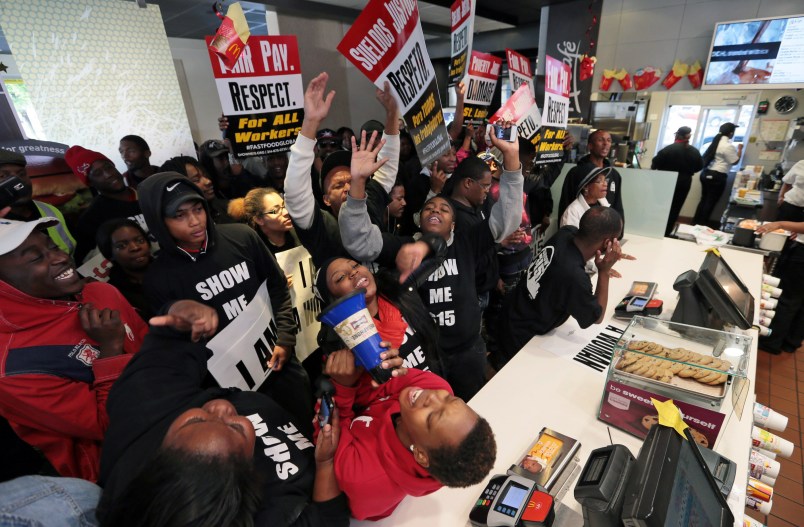Last Friday Ryan Johnson, Executive Director of The Fairness Project, joined TPM Prime members in The Hive to chat about income inequality, economic fairness, and the fight for a living minimum wage. The discussion covered everything from the efficacy of ballot initiatives in addressing these issues to the resentments engendered by the Fight for $15 movement. Here are five of Johnson’s key points.
The benefits of an increase in the minimum wage would reach far beyond the fast food industry.
“In some ways about the fact that the movement has been so focused and defined by the actions surrounding the fast food industry. It does potentially create this resentment…at The Fairness Project we are really interested in telling the stories of all workers that would benefit from a raise in the minimum wage, which as you point out reaches far past the fast food industry and touches millions of workers who have 2 and 4 year degrees and haven’t been able to find good paying jobs.”
Nearly 90% of low-wage workers are over the age of 20 .
“I think another huge misconception around income inequality is the age of people working low-wage jobs. We know from research that nearly 90% of low-wage workers are over the age of 20 and yet we hear time and time again that these increases would only benefit teenagers who would live like kings.
I think a lot of people know this isn’t true, even anecdotally. We know that lots of older Americans rely on minimum wage jobs to supplement their retirement income and we know that there are millions of parents, including single moms, that are working minimum wage jobs. Raising the minimum wage would have huge impacts not just on these workers but on their families and their communities.”
Arguing for lower regional minimum wages based on the cost of living ignores the fact that raising the minimum wage has overall positive economic benefits.
“By keeping wages in less affluent areas lower we are actually robbing these areas from reaping those benefits.
Furthermore, I would argue that the better way to think about regional wages is not in the overall wage number but in the phase-in timeline. This is what Gov Cuomo originally proposed in New York. I think we should be thinking of the minimum wage as a floor, or a ‘foundation for broad prosperity,’ not a way to hold back certain areas.
The reality in California is that a living wage for a single mother living in the central valley is still WELL above $15/hr. So, while it seems like a significant jump, it still really is what is needed throughout California in order to lift working people out of poverty.
All of that being said, I do think that if we feel comfortable that we have set a solid floor (like we just achieved in California), we should be thinking about regional adjustments UP from that floor or foundation. There is a lot of data to suggest that SF and the surrounding bay area may benefit from a significantly higher minimum wage pushing upwards of $19 or $20/hr.
It is typically large corporations that pay the minimum wage and the smaller, family owned businesses that pay what they think is fair.
“Despite what the Chamber of Commerce would like people to believe, we know that a large majority (60%) of small business owners support raising the minimum wage. That being said, I’ve also had lots of these conversations. My own brother-in-law raised similar questions. I’d encourage them to really look at the way their local economy works, and if they are willing to dive into some of the best economic research on the topic. I spent many hours talking with my brother in law about these topics and now, he is one of our strongest supporters? Why? Because I finally convinced him of this:
The greatest impact of raising the minimum wage shared economic growth. Giving minimum wage workers puts money into their pockets which they then spend locally, creating economic growth that can be shared by everyone. In other words, increases in the minimum wage help working families climb the economic ladder, building a more vibrant local economy and creating MORE customers for local businesses, driving a positive feedback cycle by which revenues increase, profits increase and businesses can actually hire more workers or pay their existing workers more.”
The minimum wage issues is specifically well suited to ballot initiatives because of its broad appeal — support cuts across typical political lines.
“We have support of independents and democrats and even some republicans. We saw in 2014 that four conservative states, South Dakota, Arkansas, Alaska and Nebraska all passes raises to the minimum wage via ballot initiative.
People recognize that workers aren’t earning enough. Raising the minimum wage makes intuitive sense to people, even conservatives. It is a way to properly value work. It is a way to reward people for putting in hard work and give them a chance to get ahead. So, that broad intuitive appeal makes it a very difficult issues to defeat at the ballot box.”







We should go beyond increasing the minimum wage - to boosting the Earned Income Tax Credit. This would allow us to tap into the great pool of wealth that has accumulated over the past 35 years, instead of just relying on business owners to pave the way.
The argument against raising the minimum wage is the cost of hamburgers will rise fifty cents. That scares people.